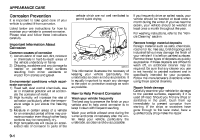2010 Suzuki Kizashi Owner's Manual - Page 351
2010 Suzuki Kizashi Manual
Page 351 highlights
EMERGENCY SERVICE If the Engine is Flooded If the engine is flooded with gasoline, it may be hard to start. If this happens, press the accelerator pedal all the way to the floor and hold it there while cranking the engine. (Do not operate the starter motor for more than 12 seconds). NOTE: If the engine refuses to start, the starter motor automatically stops after a certain period of time. After the starter motor has automatically stopped or there is anything abnormal in the engine starting system, the starter motor runs only while the engine switch is held pressed. If the Engine Overheats The engine could overheat temporarily under severe driving conditions. If the engine coolant temperature gauge indicates overheating during driving: 1) Turn off the air conditioner, if equipped. 2) Take the vehicle to a safe place and park. 3) Let the engine run at normal idle speed for a few minutes until the indicator is within the normal, acceptable temperature range shown by the white band between "H" and "C". If the temperature indication does not come down to within the normal, acceptable range: 1) Turn off the engine and check that the water pump belt and pulleys are not damaged or slipping. If any abnormality is found, correct it. 2) Check the coolant level in the reservoir. If it is found to be lower than the "LOW" line, look for leaks at the radiator, water pump and radiator and heater hoses. If you locate any leaks that may have caused the overheating, do not run the engine until these problems have been corrected. 3) If you do not find a leak, carefully add coolant to the reservoir and then the radiator, if necessary. (Refer to "Engine Coolant" in the "INSPECTION AND MAINTENANCE" section.) WARNING If you see or hear escaping steam, stop the vehicle in a safe place and immediately turn off the engine to let it cool. Do not open the hood when steam is present. When the steam can no longer be seen or heard, open the hood to see if the coolant is still boiling. If it is, you must wait until it stops boiling before you proceed. Also, be careful not to touch hot engine parts (radiator, water hoses, engine etc.). 8-8
















